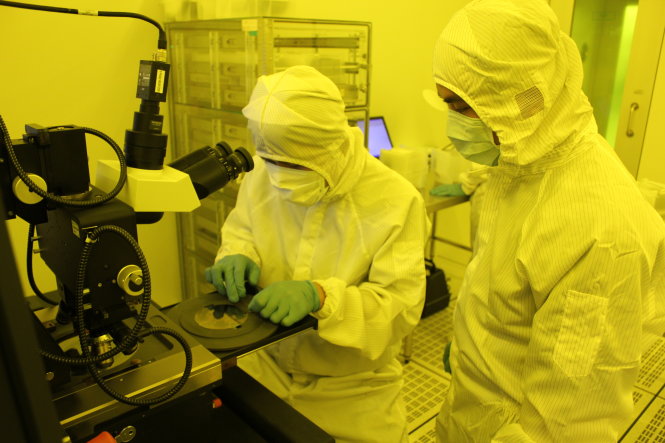Editor’s note: In this entry submitted to the “Ky Vong Viet Nam 20 Nam Toi” (“My Expectations for Vietnam in 20 Years”) writing contest, Lieu Tu Phong, a 75-year-old reader from the Mekong Delta province of Tra Vinh, dreams of a “Silicon Valley” in Da Lat , a much-loved resort town in the Central Highlands province of Lam Dong.
I reckon the construction of a “Vietnam Silicon Valley” in Da Lat in the next 20 years is a well-grounded dream. The future hi-tech facility would be integral to the country’s growth.
Though the government has worked out an industrialization strategy which aims to modernize and automate the country’s industry and agriculture, a scientific center of great prominence has yet to be built. This is already late.
Potential available
In the 1980s, the government issued a national policy on harnessing scientific and technological strides and supplying the country with power. India also came up with a similar policy, but the two countries have adopted different measures to implement the policy.
India imported on a large scale loads of used computers which fetched dirt-cheap prices and had them installed in high schools, universities, and the state apparatus. By contrast, our country imported a limited number of costly, hi-end computers and utilized them at universities and state agencies.
Ten years on, India has produced a new generation of intellectuals, including high school, graduate and postgraduate students. Millions of Indians are good at the computer, while young scientists have also made breakthroughs. Vietnam has lagged behind the South Asian country.
After 30 years, Vietnamese education has also “given birth” to generations of young, outstanding scientists. With power supplies available across the country, every home in rural areas is now equipped with a television set, a video player and cellphones. Young kids aged three or four now operate these devices with ease and many even become “programmers” for their own parents and grandparents.
Many elementary students are excellent users of computers and digital devices. They learn their lessons and do their homework on their tablets. High schoolers, undergraduates, postgraduates and scientists boast even more astounding achievements. On an upbeat note, a number of middle school and high school students, factory workers and farmers have become inventors. Some are even working to build their own helicopters or small submarines.
With such abounding scientific, aspiring human resources, I’m of the strong conviction that in the next 20 years, our country will have a “Vietnam Silicon Valley,” our scientific invention center. Many inventions would be created there, helping Vietnam advance quickly into the hi-tech sector and become a top-notch economy in the region.
Building “Silicon Valley”
Human resources are the most decisive factor to the establishment and seamless operation of such a science center. We should estimate that among several million high school students, at least a small percentage is brilliant and will make distinguished scientists in the future.
Schools now adopt favorable educational policies for poorly-performing students, but they have yet to come up with defined favorable policies for the top 10 percent of exceptional students. Such students with great aptitudes and innovation passion deserve a special education to become real talents.
It’s high time the high school curricula were computerized. They should be equipped with electronic textbooks and reference materials, along with conventional notebooks and textbooks. The computerization process needs to intensify for undergraduate and graduate students and top-notch scientists.
Organization comes second. “Silicon Valley” must be formulated and organized now on a gradual basis.
In my opinion, science associations should do the organization and counseling for such a center. We need to persuade first-class scientists to help their young successors create their own inventions. The center should adopt a policy to train talents for the country. There should also be auspicious policies for every present and future scientist, including high school and university students.
The would-be center should also provide assistance for students, particularly needy ones, factory workers and farmers who have their own inventions and invite them to the center for more innovative activities. The center should also properly regulate the activities of its full-time scientists and academia, and part-time ones at home and abroad.
Investment and location are the two last key factors. There are two sources of investment. The government should make an initial investment, while calls for further investment should be made among local and foreign groups, particularly multinational commercial and scientific organizations currently operating in Vietnam. I believe that a few years after the center comes into operation, we would reap initial fruits and the financing would be reduced by then.
Regarding the center’s location, I think Da Lat would be a perfect choice with all the auspicious conditions it has to offer. The resort city has stable weather and is quite isolated from the hustle and bustle of major cities. Its people are amicable and friendly. Furthermore, Da Lat is a developing city with relatively complete traffic infrastructure. Many years ago, Da Lat was also picked for the establishment of the country’s first-ever nuclear power research center.
|
“Ky Vong Viet Nam 20 Nam Toi” is a competition organized by the World Bank in Vietnam and Tuoi Tre (Youth) newspaper that encourages local youths to write down their wildest, yet feasible, dreams about how Vietnam will change in 20 years’ time. |





















































